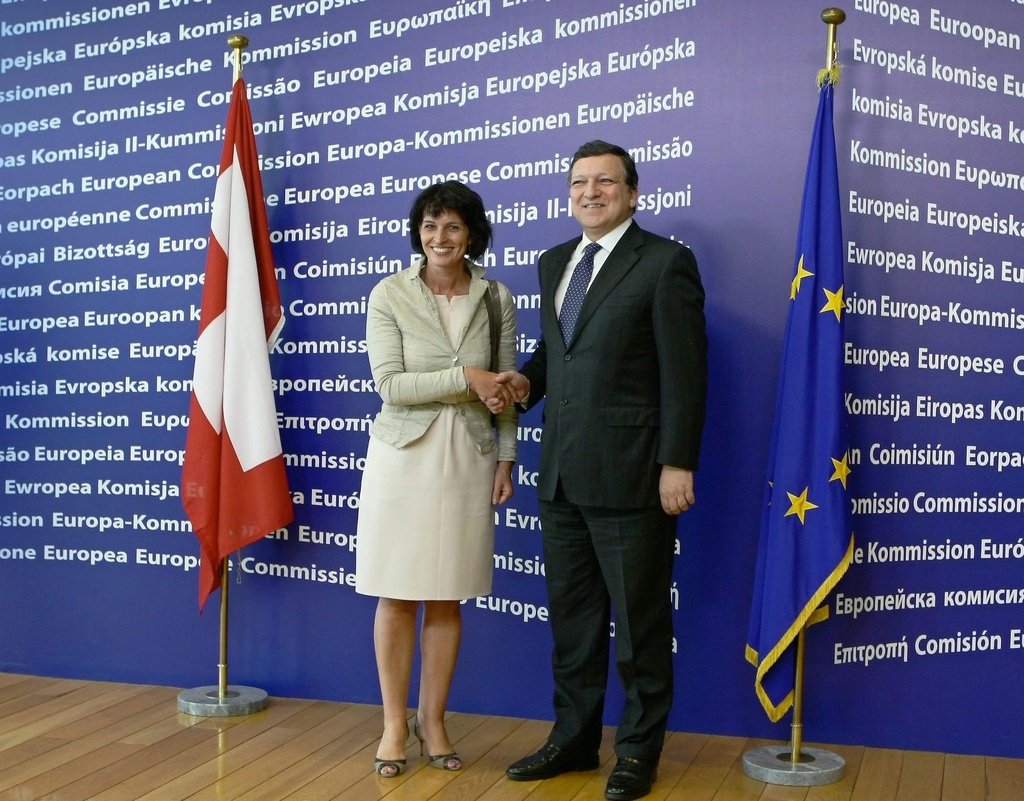
Swiss-EU experts to look at bilateral options

Switzerland and the European Union are setting up a working group to hammer out options for a potential accord to govern – and simplify - bilateral relations.
President Doris Leuthard was in Brussels on Monday for talks with European Union leaders.
There, both the EU and Switzerland announced a willingness to review and improve relations, working on the principle of a global bilateral cooperation accord between the two.
However, a cautious Leuthard noted that while it was correct to take steps to simplify relations, “we do not see how that will done in practice”.
Switzerland is not a member of the EU but it has concluded 20 major bilateral agreements with the 27-nation bloc, and another 100 secondary accords.
But Brussels no longer wants to sign tailor-made agreements with Switzerland, which is being told to align itself on EU rules and regulations.
A working group of experts will be set up to look at “possible options” and is expected to report back by the end of the year. One of the ideas being studied will be a global cooperation accord.
After meeting with Leuthard, the president of the European Commission, José Manuel Barroso, said the “network of bilateral accords” between the two sides had become “complex, very hard to manage”.
“We agree to establish a joint working group to look at the options,” said Leuthard, but she noted that the basis “for these experts will be that we respect” Swiss sovereignty and the “proper functioning of existing institutions”.
Barroso added that the working group had to respect Switzerland’s past refusal to join the European Economic Area and its shelving of an application to join the EU.
The working group is a first step towards repairing bilateral ties, which have been recently pulled in different directions by Switzerland and Brussels.
Brussels has said that some of Bern’s bilateral demands are out of proportion, such as wanting to continue exports to the Middle East of cigarettes with tar and nicotine concentrations banned in the EU.
Solidarity
Also on Monday, the president of the Council of the European Union, Herman Van Rompuy, warned that during future negotiations for bilateral accords Switzerland would need to take up the EU’s legal framework if it wanted access to the market.
He called for a “common search for solutions”, and referred to a decision in 2008 by the 27 EU members to change policy to Switzerland and other members of the European Free Trade Association – namely, that “the use and interpretation of European law” must be seen as an “indispensable condition” when concluding future accords.
In a parallel process, the Swiss government will publish on August 18 a report on the country’s European integration policy and will have to answer the question whether bilateral accords are still a valid option.
And the Union’s 27 foreign ministers are also planning to discuss the relationship between Brussels and Bern in December.
After previous rounds of bilateral accords in 1999 and 2004, Switzerland and the EU are talking about possible new accords, on topics such as the electricity market, consumer protection and the commercialisation of chemical products.
The EU is interested in adding other issues to the package, including a series of tax-related items: improving the fight against fraud, direct taxation, extending the application of the EU rules on taxing savings and the application of the EU’s code of conduct for the taxation of companies.
On Monday Leuthard expressed concern over an EU proposal to subject Switzerland to a code of conduct in a move to avoid unfair tax competition and the relocation of businesses that it entails. Leuthard asked why an internal EU code should apply to Switzerland.
The talks also covered the economic crisis and the euro. Leuthard said Switzerland had an interest in the EU’s economic recovery, even if it does not belong. “We feel solidarity, we want a strong and economically viable Europe.”
swissinfo.ch and agencies
Switzerland is not a member of the EU but it has concluded 20 major bilateral agreements with the 27-nation bloc.
There are also about 100 secondary bilateral accords between Bern and Brussels.
Negotiations are underway for a bilateral treaty aimed at regulating access to cross-border electricity and a free trade accord on agriculture.
Switzerland has to consider closer ties with the EU to maintain its sovereignty and position as a wealthy nation, experts say.
Think tank Avenir Suisse says continuing relations with the EU on the basis of bilateral treaties is not promising for the future.
Three possible scenarios are put forward: a new attempt at joining the European Economic Area (EEA) treaty; full membership of the EU, albeit without taking on the euro currency; or a global alliance of small and medium-sized states in Europe, Asia and Latin America.
Voters in 1992 narrowly rejected the European Economic Area treaty at the polls following a campaign by the rightwing Swiss People’s Party.
An application for EU membership has effectively been shelved, but not withdrawn.
Links
Economics ministryExternal link

In compliance with the JTI standards
More: SWI swissinfo.ch certified by the Journalism Trust Initiative




























You can find an overview of ongoing debates with our journalists here . Please join us!
If you want to start a conversation about a topic raised in this article or want to report factual errors, email us at english@swissinfo.ch.